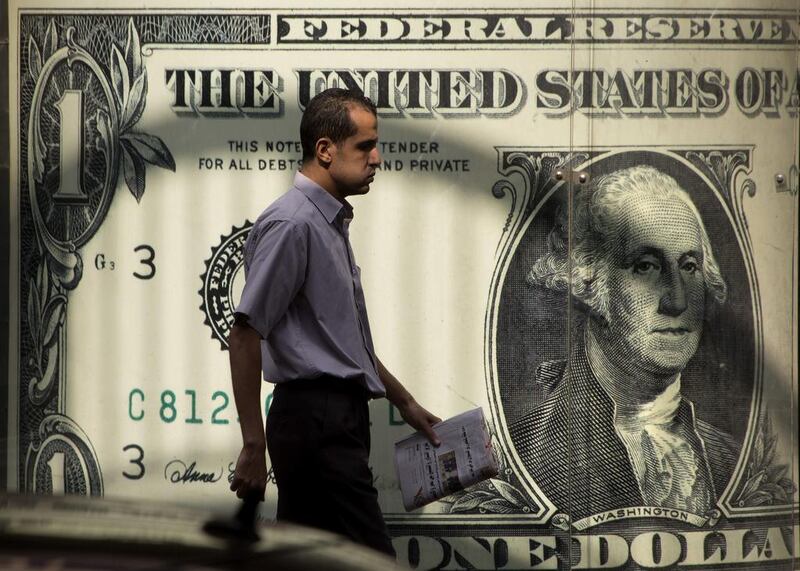Egypt’s currency yesterday fell by almost a third to 13 pounds against the dollar from a previously fixed rate of 8.85 pounds following a statement by the central bank saying that it was letting the pound float.
The move to a more flexible exchange rate had been telegraphed in advance over the summer by central bank governor Tarek Amer and will help the Arab world’s most populous nation fulfil one of the key conditions needed to lock in a US$12 billion bailout loan from the IMF.
The struggling nation is betting that the adoption of a more flexible exchange rate, coupled with aid, will boost investment in as it struggles economically.
“The CBE [central bank of Egypt] hereby announces its decision to move, with immediate effect, to a liberalised exchange rate regime in order to quell any distortions in the domestic foreign currency market,” the bank said in a statement.
“This move will allow market demand and supply dynamics to work effectively in order to create an environment of reliable and sustainable provision of foreign currency.”
The central bank also raised its key interest rates by 300 basis points and said that it would also stop trying to control what can be imported. The bank said the starting exchange rate would “serve as soft guidance to jump-start the market”. The dollar was selling for as much as 14.25 in some banks in Egypt after the announcement.
The country has yet to fulfil other conditions set by the IMF. As well as moving to a more flexible exchange rate, the IMF has asked Egypt to reduce energy subsidies that weigh heavily on its budget and raise an additional $6bn in financing, mostly from allies in the Arabian Gulf, before it starts disbursing the loan. “We welcome the central bank of Egypt’s decision to liberalise the foreign exchange system and adopt a flexible exchange rate regime,” said Chris Jarvis, IMF mission chief for Egypt.
“The flexible exchange rate regime, where the exchange rate is determined by market forces, will improve Egypt’s external competitiveness, support exports and tourism and attract foreign investment. All of this will help foster growth, job creation and stronger external position for the country.”
Egypt’s economy grew by 4.2 per cent last year according to the IMF, a rate that is expected to slow to 3.8 per cent this year and 4 per cent next year.
Investors also cheered the news as Egyptian shares rallied by as much as 8.3 per cent before shedding some gains.
“Lessons learnt from the previous float experience in 2003 proved that a float scenario with no restrictions and confidence- building measures reaped better results for the economy, debt and equity markets,” said Reham ElDesoki, an economist at investment bank Arqaam Capital, based in Dubai. This is not the first time Egypt has moved to a more flexible exchange rate. In January 2003, the country devalued the currency by 14 per cent – a move that killed a black market trade in US dollars and attracted billions of dollars in international investment before the financial crash of 2008.
Egypt relies heavily on inflows of hard currency and has been suffering for years from decreasing receipts from key sources including foreign direct investment, the Suez Canal, remittances from Egyptians abroad and tourism – especially since the downing of a Russian jet that exploded in October last year over Sinai.
Egypt has resisted letting its currency freely float and has instead made piecemeal devaluations since the uprising that removed the former president Hosni Mubarak in February 2011. The cost of defending the Egyptian pound has been high, however. Despite the billions of US dollars pumped into Egypt by its oil-rich allies in the Gulf, including the UAE, the country’s foreign reserves were reduced by more than half to about $16bn at one point since 2011, but have since partially recovered amid stringent controls on imports. Since 2011, Gulf nations have pumped more than $20bn into Egyptian coffers.
Still, investors say Egypt will need to do more than just fix monetary policy to become an attractive destination, and fiscal measures such as reducing energy and food subsidies also need to be implemented.
“We view the EGP devaluation as a positive catalyst for the credit and equity investment case of Egypt,” said Mohamed Jamal, managing director of capital markets at Abu Dhabi investment company Waha Capital, who oversees more than $300 million in mostly Middle East and North African stocks and bonds. “Nevertheless, this devaluation is not an end in itself, but a monetary tool that has to be considered in the context of a comprehensive reforms package, including fiscal policy adjustments, monetary policy and other structural reforms.”
The Egyptian central bank devalued the Egyptian pound by 13 per cent in March, but that failed to kill the trade of the US dollar in the black market, which in recent weeks has fetched as much as 18 pounds.
Meanwhile, a key measure of non-oil private sector business activity in Egypt, sponsored by the Dubai-based bank Emirates NBD, fell to a 39-month low last month, weighed down by the difficulty companies have had sourcing dollars, the bank said yesterday.
The purchasing managers’ index fell to 42 last month from 46.3 in September, it said.
A reading above 50 indicates that the non-oil economy is growing, while a reading below 50 suggests that it is contracting.
mkassem@thenational.ae
Follow The National's Business section on Twitter





